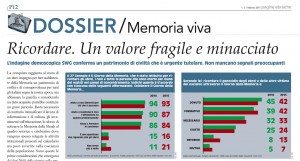Scenarios for a Changing Italy
Special: Shoah Memorial Day
Considering the Memory of the Shoah definitely acquired, after all the hard work aimed at making it a permanent heritage of civilization and awareness for all Italians, could be a serious danger. It is still necessary to intensify the work of information and cultural programmes and to invest in education. There must be an effort to rescue the Memory of the Shoah from the rhetorical framework of the official celebrations, to avoid the risk that the consciousness in the population becomes lower and lower.
These are the first considerations emerging from the last research on the perception of Memory by Italians. The report “Scenari di un’Italia che cambia – Speciale per il Giorno della Memoria” (Scenarios for a Changing Italy – Special for the Shoah Memorial Day) by the research institute SWG Lab with the collaboration of Pagine Ebraiche, just came out in its second edition, based on data collected in January 2015, and it has been presented on the February issue of the newspaper of Italian Jewry.
“This is an important step – comments Riccardo Grassi, director of research institute – because for the first time we have a tool that is apt to measure what Italians think and understand of Memory. Comparing the latest data with the indicators that came out of the first study, carried out in January 2014, we can also find a confirmation of the soundness of the considerations that emerged a year ago. And above all we can measure how the perception of public opinion evolves over time.”
The comparison with the most recent data confirms many of the elements that emerged a year ago: the first is that there is a solid acquired foundation of knowledge, an important element of balance and culture for our society. But there come also some alarms.
The first is the degree of perception, that – even if still strong – is in sharp decline. As the years pass and we move away from that tragic period, as we overlap present concerns to historical consciousness and direct testimony, Memory is exposed to great risks. According to the survey anticipated by Pagine Ebraiche the perception of a strong involvement with the Holocaust Remembrance Day falls from the 42 percent recorded in 2014 to 39 percent this year. Not a huge reduction, but it is still significant and alarming, especially when read in a time perspective, with the risk of a Memory increasingly faded. The sum of those who think of it as a matter that interests only Jews and those who think that “it has no more use” is strongly increasing.
But the research has many other points of interest, that need serious considering. “In other words – confirms Grassi – where the action of schools is not balanced with cultural and social activities values are duly reinforced, but they are likely to remain in an empty institutional dimension”.
Data also show a moderate but alarming growth of negative reactions to the activities dedicated to Memory. The number of Italians that consider it “rhetoric” or “useless” when is growing, and behind their feelings there is the risk that intolerance, denial of history and hatred take place. The research was conducted on a sample of one thousand respondents the same used by SWG to analyze the political orientation of Italians, a champion considered ì very reliable and that has a methodological stability. Answers came through a CAWI survey (Computer Assisted Web Interviewing). The results relate to four questions, two direct – for which multiple responses were allowed – and two projective (ie that help delineate indirectly what the respondent thinks, without making him feel directly involved).
In this last survey the complex and delicate reading of those differences that characterize the different political sensitivities and the different demographic components of Italian society has started. “The road to an internalization of the values of Memory – wrote Pagine Ebraiche a year ago – is still long and perhaps requires a thorough reflection”. This year we can confirm this analysis and add an element of attention, and amore moderate alarm. Compared to the warning issued in 2014 now the “perhaps” sounds like excessive caution. The elements that seem to be taking shape do not appear comforting: they suggest that the level of attention on the part of Italian Jews – and all those who want to ensure their children the opportunity to live in a better world – must be kept very high.

